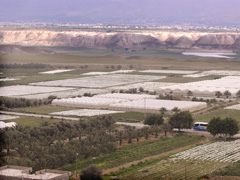- Home
- About JICA
- President's Desk
- Former President's Visits & Remarks
- OGATA Sadako
- JICA President Ogata Visits Israel, Palestine and Syria During Middle East Tour (Middle East)
OGATA Sadako
March 5, 2008
JICA President Ogata Visits Israel, Palestine and Syria During Middle East Tour

In Jericho in the southern part of Jordan Valley, many projects are ongoing under the "Corridor for Peace and Prosperity" project.
President Sadako Ogata Wednesday (March 5) flew to the Middle East as part of Japan's continuing efforts to strengthen the Middle East peace process by fostering economic and social development in the region.
She will hold talks with government, international and local officials in Israel, Palestine and Syria during her March 5-13 tour after meeting Israeli Prime Minister Ehud Olmert in Tokyo last week, when the two discussed not only JICA's role in the region but also how Israel could help in Africa’s development.
Mrs. Ogata visited Sudan and Ethiopia in February to underline her agency's commitment to increasing assistance to that region.
In the Middle East, the Japanese government has initiated a project, the Concept for Creating the Corridor for Peace and Prosperity, to promote closer ties between Israel, Jordan and Palestine. In 2007 JICA began three new regional agricultural and water schemes as part of the project, including two feasibility studies to establish an agro-industrial park in the Jordan Valley and a related water resource development plan and a third project to strengthen the support system for sustainable agriculture.
The "Corridor for Peace" refers to the Jordan Valley, a key geographical landmark on the West Bank straddling Israel and Jordan. The agro-industrial park would promote the development of agriculture and related industries, but because the region is semi-arid, water resources must also be improved.
Once the park and a distribution center are established, Japan has said it will help finance a follow-up scheme to transport products to markets overseas, helping to raise the regional standard of living.
Another major JICA initiative has been the recent distribution among tens of thousands of Palestinian families of a mother and child health handbook, the first of its kind developed in Arabic.
The handbook provides practical advice and basic information for pregnant women and new mothers as well as including a complete health record of a woman's pregnancy, childbirth and the child’s subsequent growth.
Simple though the outline is, the handbooks are particularly important in conflict regions such as Palestine, where women often face enormous difficulties in visiting their regular hospitals or clinics and may need to seek treatment further afield in unfamiliar institutions.
Mrs. Ogata will also discuss with officials another project in which Israel and Egypt are cooperating to not only boost agricultural production but also to strengthen trust between Israel and its neighbors.
She will visit Syria March 9-13 where JICA is implementing projects in such areas as water resource management and environmental protection, the strengthening of public services and of social and economic systems. She will also visit a refugee camp in Syria which hosts huge uprooted populations, including recent arrivals from Iraq.
As the High Commissioner of the UN Refugee Agency UNHCR during the 1990s, Mrs. Ogata was heavily involved in regional refugee problems, particularly in the wake of the first Gulf War.
- About JICA
- News & Features
- Countries & Regions
- Our Work
- Thematic Issues
- Types of Assistance
- Partnerships with Other Development Partners
- Climate Change / Environmental and Social Considerations
- Evaluations
- Compliance and Anti-corruption
- Science and Technology Cooperation on Global Issues
- Research
- JICA Development Studies Program / JICA Chair
- Support for the Acceptance of Foreign HRs / Multicultural and Inclusive Community
- Publications
- Investor Relations
